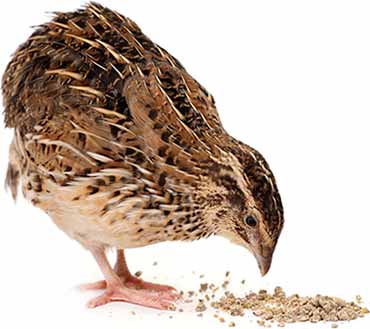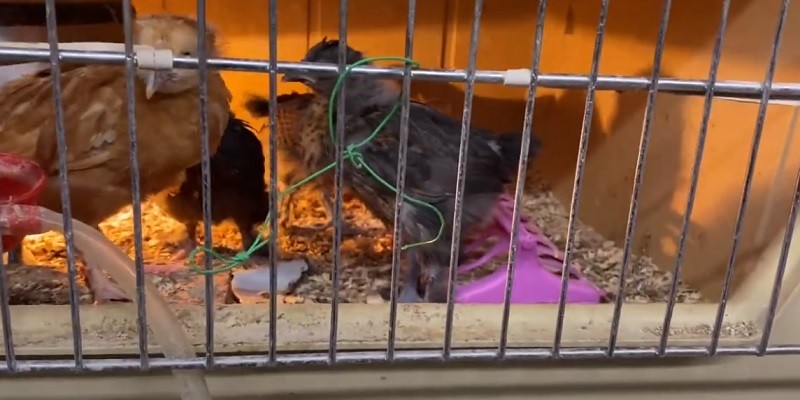Last Updated on April 23, 2025 by Pauline G. Carter
Quail can eat chicken feed, although it’s not ideal. Quail have different nutritional needs than chickens.
Raising quail has become increasingly popular both as a hobby and commercially for their eggs and meat. Feeding quail the right diet is critical for their health and productivity, and while they can consume chicken feed in a pinch, it is not formulated to meet their specific dietary requirements.
Quail require a higher protein content and certain minerals that chicken feed does not usually provide in the necessary quantities. For optimal health and growth, quail should be fed a game bird feed or a quail-specific feed that caters to their unique needs. Indeed, keen poultry enthusiasts will notice that their quail thrive best on a diet tailored just for them, rather than a one-size-fits-all poultry feed.
Quail Nutrition
When delving into the care of quail, an essential aspect is diet. Quail nutrition is paramount to their overall health, vitality, and productivity. Their dietary requirements differ slightly from those of chickens; thus, quail custodians must understand the specific needs of these birds. This section takes a closer look at the nutritional essentials that quail require for optimal health and growth, and how their diet contrasts to that of their chicken counterparts.
Essential Nutrients For Optimal Health And Growth
Quail are active birds requiring a balanced mix of nutrients for peak condition, including:
- Proteins: Vital for growth and repair of tissues
- Vitamins: A range of vitamins, particularly A, B-complex, D, E, K for various body functions
- Minerals: such as calcium, necessary for strong egg shells and skeletal development
- Amino acids: like lysine and methionine for overall health
- Fats: a source of energy and essential fatty acids
- Carbohydrates: for sustained energy
Quail diets must be fine-tuned to their life stage, from high-protein chick starters to nutrient-rich adult maintenance blends.
| Nutrient | Importance |
|---|---|
| Protein | Crucial for development, especially in young quail |
| Calcium | Integral to shell and bone health |
| Vitamins | Necessary for immune function and vitality |
Comparing Quail Dietary Requirements To Chickens
While it may seem convenient to feed quail chicken feed, these birds have distinct dietary needs. Quail generally require a higher protein content compared to chickens, particularly in their growing stages. An adult quail diet needs approximately 20-22% protein, whereas chickens can thrive on 16-18%.
Additionally, quail have smaller beaks and digestive systems, often necessitating fine-crumbled or pelletized feed that is easier for them to ingest and digest. Feed intended for chickens might be too large or not as nutrient-dense as needed for the specific requirements of quail.
Care must be taken to ensure that quail have access to sufficient amounts of calcium, especially laying quail. Their need for calcium can be higher than that of chickens due to their rapid egg-laying cycle. Specialized quail feed or supplementation is often necessary to meet these stringent nutritional demands.
Can Quail Eat Chicken Feed Safety
Exploring a vital question in the world of avian diets: ‘Can Quail Eat Chicken Feed Safety’? Owners of these delightful birds often wonder if they can streamline their feeding routine by offering quail the chicken feed they might already have on hand. While the convenience seems tempting, it’s crucial to dive into the specifics to ensure the well-being of quails.
Assessing The Risks And Benefits Of Quail Consuming Chicken Feed
Before introducing chicken feed to quail, a careful balance of potential risks and benefits must be weighed:
- Protein Content: Quail require a high-protein diet, especially in their early growth stages. Chicken feed, while somewhat high in protein, often doesn’t meet the quail’s specific needs.
- Nutritional Differences: Quail have different nutritional requirements compared to chickens. Essential vitamins and minerals might be present in different quantities, which could lead to deficiencies or excesses in quail.
- Size and Shape of Pellets: The physical form of standard chicken feed may not be suitable for the smaller size and different eating habits of quail.
- Benefit of Convenience: If modification is possible, feeding quails chicken feed can simplify the caretaker’s tasks and possibly reduce costs.
- Health Concerns: Consuming chicken feed without the necessary adjustments might lead to health problems in quail, such as poor growth, lower laying rates, or even obesity.
Necessary Modifications To Chicken Feed For Quail Consumption
To ensure safe and nutritional provision of chicken feed to quail, consider these essential modifications:
| Aspect | Modification Needed |
|---|---|
| Nutrient Levels | Supplement with additional protein and necessary vitamins/minerals specific to quail. |
| Feed Form | Grind or crumble pellets to suitable size for quail consumption. |
| Mycotoxin Control | Ensure the feed is free from mycotoxins, which are especially harmful to quail. |
| Medicated Feed | Avoid feeds medicated for specific chicken diseases, as these may not be appropriate or safe for quail. |
While the question ‘Can quail eat chicken feed?’ can’t be answered with a simple yes or no, with the right alterations, quail can have their dietary needs met adequately through modified chicken feed. Always consult an avian nutrition expert before making changes to quail diets.
Alternative Quail Feeding Options
Exploring the world of quail nutrition can lead to several inventive, practical, and balanced ways to feed these delightful birds. While chicken feed can serve as a base diet for quail, it’s not tailored to their specific dietary needs. Delving into alternative quail feeding options benefits the health and vitality of your feathered friends. Implementing a mix of custom homemade recipes, commercial feeds designed for quail, and allowing natural foraging can greatly enhance their overall well-being. Let’s look at ways to diversify the diet of quails, ensuring they receive all the necessary nutrients for a thriving life.
Customizing Feed: Homemade Recipes For Quail
If you’re interested in personalizing your quail’s diet, consider whipping up a batch of homemade feed. With the right balance of protein, vitamins, and minerals, you can craft a nutritious and wholesome meal your quails will love. Here are some key ingredients and steps for a custom blend:
- Protein sources such as mealworms, cooked eggs, or dried fish
- Grains like millet, quinoa, and cracked corn for energy
- Greens for minerals—kale, spinach, or lettuce
- Calcium-rich foods such as crushed oyster shell or bone meal
- A variety of seeds for extra nutrients and variety
Mix these ingredients based on the age and nutritional needs of your quails for a customized dietary approach.
Commercial Feeds Formulated Specifically For Quail
Although more convenient, not all commercial feeds are created equal. It’s crucial to select options that cater to the distinct requirements of quails. Commercial feeds formulated specifically for quail come packed with the right balance of proteins, amino acids, and essential nutrients. A simple product comparison table can help:
| Brand | Protein Content | Key Ingredients |
|---|---|---|
| QuailPro Feed | 24% | Soybean Meal, Fish Meal, Millet |
| FeatherFancy | 22% | Sorghum, Wheat, Krill Meal |
| QuailKing Essentials | 25% | Alfalfa Meal, Corn, Peas |
Look for these specialized feeds at your local farm supply store or online to provide optimal nutrition.
Natural Foraging And Supplementary Food Sources
Quails are natural foragers, and providing an environment where they can exhibit this behavior greatly enriches their habitat. Offering safe spaces for natural foraging can allow them to consume a variety of insects, seeds, and plants which can constitute a vital part of their diet. When supplementing their feed with other food sources, consider the following:
- Allow access to a controlled outdoor space where quails can forage if your setup permits.
- Introduce live insects such as crickets or mealworms to mimic their natural food selection.
- Giving them access to leafy greens and vegetables can help fulfill their need for micronutrients.
Remember, diversity in diet not only meets nutritional needs but also encourages natural behavior, making quails happier and more active.

Credit: poultrykeeper.com
Frequently Asked Questions For Can Quail Eat Chicken Feed?
Is Quail Feed Different From Chicken Feed?
Quail feed contains higher protein content and smaller particle sizes compared to chicken feed, catering specifically to quails’ dietary needs.
Can Quail Safely Consume Chicken Feed?
Quail can eat chicken feed temporarily; however, it lacks the necessary protein and micronutrients essential for their optimal health.
What Feed Is Best For Quails?
The best feed for quails is game bird feed with a protein content of 24-30%, small-sized grains, and a balance of necessary vitamins and minerals.
Are There Risks In Feeding Quails Chicken Feed?
Feeding quails chicken feed may lead to nutritional deficiencies due to lower protein levels and inadequate grain size for their small beaks.
How Does Quail Feed Optimize Their Health?
Quail feed is formulated to support their high metabolism, egg production, and overall health with enriched protein, vitamins, and essential minerals.
Can Baby Quails Have Chick Starter Feed?
Baby quails, known as chicks, can have chick starter feed if it’s non-medicated and has at least 24% protein; however, game bird starter is preferred.
Conclusion
Wrapping up, quail can indeed consume chicken feed, but moderation is key. Opt for feed specific to their dietary needs for optimal health. Remember that a balanced diet ensures your quail thrives. Your feathered friends count on you to make informed choices about their nutrition.
Choose wisely!

